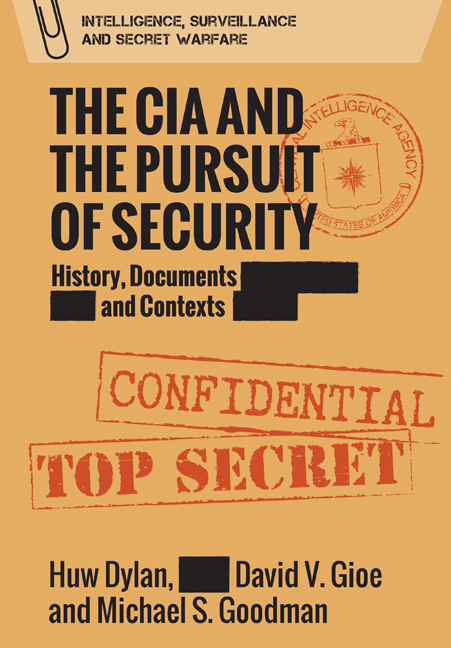Book contents
- Frontmatter
- Contents
- List of Documents
- Foreword
- Acknowledgements
- Introduction
- 1 Intelligence for an American Century: Creating the CIA
- 2 The Development of CIA Covert Action
- 3 A ‘Gangster Act’: The Berlin Tunnel
- 4 The CIA and the USSR: The Challenge of Understanding the Soviet Threat
- 5 Anglo-American Intelligence Liaison and the Outbreak of the Korean War
- 6 The CIA and the Bomber and Missile Gap
- 7 The CIA and Cuba: The Bay of Pigs and the Cuban Missile Crisis
- 8 The CIA in Vietnam
- 9 The CIA and Arms Control
- 10 The CIA’s Counter-Intelligence Conundrum: The Case of Yuri Nosenko
- 11 1975: The Year of the ‘Intelligence Wars’
- 12 Watching Khomeini
- 13 The CIA and the Soviet Invasion of Afghanistan
- 14 Martial Law in Poland
- 15 Able Archer and the NATO War Scare
- 16 The Soviet Leadership and Kremlinology in the 1980s
- 17 The CIA and the (First) Persian Gulf War
- 18 A Mole in Their Midst: The CIA and Aldrich Ames
- 19 ‘The System was Blinking Red’: The Peace Dividend and the Road to 9/11
- 20 Reckoning and Redemption: The 9/11 Commission, the Director of National Intelligence and the CIA at War
- 21 The ‘Slam Dunk’: The CIA and the Invasion of Iraq
- 22 The Terrorist Hunters Become Political Quarry: The CIA and Rendition, Detention and Interrogation
- 23 Innovation at the CIA: From Sputnik to Silicon Valley and Venona to Vault 7
- 24 Entering the Electoral Fray: The CIA and Russian Meddling in the 2016 Election
- 25 Flying Blind? The CIA and the Trump Administration
- Bibliography
- Index
24 - Entering the Electoral Fray: The CIA and Russian Meddling in the 2016 Election
Published online by Cambridge University Press: 24 September 2020
- Frontmatter
- Contents
- List of Documents
- Foreword
- Acknowledgements
- Introduction
- 1 Intelligence for an American Century: Creating the CIA
- 2 The Development of CIA Covert Action
- 3 A ‘Gangster Act’: The Berlin Tunnel
- 4 The CIA and the USSR: The Challenge of Understanding the Soviet Threat
- 5 Anglo-American Intelligence Liaison and the Outbreak of the Korean War
- 6 The CIA and the Bomber and Missile Gap
- 7 The CIA and Cuba: The Bay of Pigs and the Cuban Missile Crisis
- 8 The CIA in Vietnam
- 9 The CIA and Arms Control
- 10 The CIA’s Counter-Intelligence Conundrum: The Case of Yuri Nosenko
- 11 1975: The Year of the ‘Intelligence Wars’
- 12 Watching Khomeini
- 13 The CIA and the Soviet Invasion of Afghanistan
- 14 Martial Law in Poland
- 15 Able Archer and the NATO War Scare
- 16 The Soviet Leadership and Kremlinology in the 1980s
- 17 The CIA and the (First) Persian Gulf War
- 18 A Mole in Their Midst: The CIA and Aldrich Ames
- 19 ‘The System was Blinking Red’: The Peace Dividend and the Road to 9/11
- 20 Reckoning and Redemption: The 9/11 Commission, the Director of National Intelligence and the CIA at War
- 21 The ‘Slam Dunk’: The CIA and the Invasion of Iraq
- 22 The Terrorist Hunters Become Political Quarry: The CIA and Rendition, Detention and Interrogation
- 23 Innovation at the CIA: From Sputnik to Silicon Valley and Venona to Vault 7
- 24 Entering the Electoral Fray: The CIA and Russian Meddling in the 2016 Election
- 25 Flying Blind? The CIA and the Trump Administration
- Bibliography
- Index
Summary
As the leaves began to turn in the cool October air, the Kremlin's electoral rhetoric was heating up in the final weeks leading to the hotly contested American presidential election. With an economic recession eight years in the rear-view mirror, America's economy was again booming, even if its ill-conceived overseas military efforts were going badly in the face of a determined insurgent force hiding among a sympathetic populace. As the generals were complaining about dwindling force levels, politicians were again debating the proper scope of national health insurance legislation. But there was trouble afoot.
From his office overlooking the brilliant autumnal foliage, a worried senior CIA official decided to inform the Director, a registered Republican, ‘In the last few months … new elements in [Moscow’s] attitude have become evident.’ Specifically, since the nomination convention, Moscow’s leaders ‘have taken up a harsher propaganda line’. Speaking for the Board of National Estimates, its Chairman observed that this ‘propaganda line reflects some genuine concern’ along the Moskva river. Indeed, something was different this campaign season. ‘This year’, wrote the Chairman, the veteran intelligence officer Sherman Kent, Moscow had ‘made it plain that there are sharp distinctions between the contending parties and policies’ and that the Kremlin has made ‘their preference’ known. It was 1964.
If Director of Central Intelligence John McCone was alarmed upon receipt of the Board's assessment of Soviet propaganda, he need not have been. Its impact was probably marginal. Lyndon Johnson certainly did not need Soviet Premier Nikita Khrushchev's assistance to secure his crushing victory over Barry Goldwater. This was not the last time, however, that the Director of Central Intelligence would receive an October memo warning about Soviet meddling in a presidential election. Nearly twenty years later, the Politburo would again discern marked policy differences between the White House incumbent and his challenger.
A politically attuned lawyer, Bill Casey served as Ronald Reagan's campaign manager before being named Director of Central Intelligence. Less than two years into the job, he received a memo proposing a ‘study to determine the evidence, if any, of Soviet efforts to influence previous US elections … and to judge the prospects for such activity in 1984’.
- Type
- Chapter
- Information
- The CIA and the Pursuit of SecurityHistory, Documents and Contexts, pp. 481 - 492Publisher: Edinburgh University PressPrint publication year: 2020



